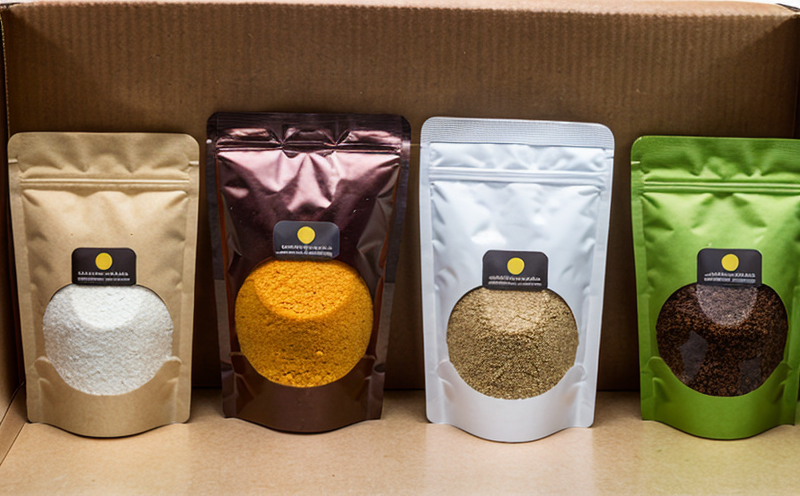Nanomaterial Migration Testing in Food Contact Materials
The use of nanomaterials in food contact materials and packaging (FCM) has gained significant traction due to their potential benefits, such as extended shelf life, improved barrier properties, and enhanced functionality. However, the introduction of these nanoscale additives into FCM raises concerns regarding their migration into foods during storage and consumption. Ensuring that nanomaterials do not migrate in harmful quantities is paramount for maintaining food safety standards.
The testing of nanomaterial migration from FCM into food products involves a multi-step process aimed at assessing the potential transfer of these materials under specific conditions. This service ensures compliance with international regulations, such as those outlined by the European Union (EU), the United States Food and Drug Administration (FDA), and other national standards.
For this testing, samples are prepared following standard protocols. These samples undergo a series of tests designed to mimic real-world storage and handling conditions. The methodologies used include soaking the materials in different food simulants under various temperature and time conditions. This allows for the accurate measurement of nanomaterials that may migrate into the food matrix.
The testing process involves advanced analytical techniques such as Inductively Coupled Plasma Mass Spectrometry (ICP-MS), which is capable of detecting trace elements at very low concentrations. Other methods include Fourier Transform Infrared Spectroscopy (FTIR) and Transmission Electron Microscopy (TEM), which provide structural insights into the nanomaterials.
Once testing is complete, detailed reports are generated, providing comprehensive data on any detected migration levels. Compliance with relevant standards and guidelines is verified through these analyses. The service also includes advice on how to modify materials or processes if necessary to reduce the risk of migration below acceptable limits.
| Test Parameters | Description |
|---|---|
| Nano-scale particle size analysis | Determines the distribution and average size of nanoparticles present in FCMs |
| Simulant selection | Critical for simulating real-world conditions, including water, oil, and acidic or basic solutions |
| Temperature and time duration | Varying these factors to assess migration under different storage scenarios |
| Sample preparation techniques | Involves soaking FCMs in simulants for extended periods |
| Analytical methods used | ICP-MS, FTIR, TEM, among others |
The testing process is not only critical for ensuring food safety but also for maintaining consumer confidence and regulatory compliance. This service plays a pivotal role in safeguarding the integrity of FCMs used in the manufacturing and packaging industries.
Scope and Methodology
- Sample preparation following standard protocols
- Soaking in different food simulants under varying temperature and time conditions
- Use of advanced analytical techniques like ICP-MS, FTIR, and TEM
The scope includes the evaluation of nanomaterials present in various FCMs such as plastics, coatings, and laminates. The methodology is tailored to ensure that any migration of these materials into food products does not exceed regulatory limits.
| Test Conditions | Description |
|---|---|
| Simulant types | Incorporate water, oil, acidic and basic solutions to mimic real-world conditions |
| Temperature ranges | Vary from room temperature up to 120°C to simulate different storage scenarios |
| Duration of soaking | Range from a few hours to several days depending on the material type and simulants used |
| Analytical techniques | Detailed methods for quantifying nanomaterials in food simulants |
The testing process is conducted with strict adherence to international standards such as ISO 21934 and ASTM D886, ensuring that the results are reliable and reproducible.
Eurolab Advantages
- State-of-the-art laboratory facilities equipped for nanomaterial analysis
- Experienced technical staff with expertise in FCM testing
- Comprehensive reporting services to guide clients on necessary modifications
Our team of experts at Eurolab brings a wealth of experience and knowledge to this service. With cutting-edge facilities, we ensure that every test is conducted under optimal conditions. Our experienced staff are well-versed in the latest techniques and methodologies for FCM testing, providing accurate results.
The comprehensive reporting provided by our team not only includes detailed analytical data but also offers recommendations on how to modify materials or processes to reduce migration risks. This service is designed to help clients ensure compliance with international standards while maintaining product safety and quality.
Competitive Advantage and Market Impact
- Accurate testing of nanomaterials in complex FCMs
- Adherence to stringent international standards ensuring reliability
- Support for continuous improvement through detailed reporting
This service provides a competitive edge by offering accurate and reliable data on nanomaterial migration, which is crucial for maintaining compliance with regulatory requirements. Our commitment to quality ensures that clients can trust the results provided, thereby enhancing their reputation in the market.
The impact of this service extends beyond mere compliance; it helps companies stay ahead of emerging trends and regulations in FCM testing. By offering detailed insights into potential migration risks, we empower our clients to make informed decisions that enhance product safety and consumer confidence.





